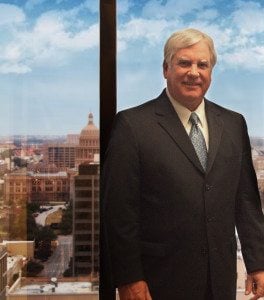
Green on Green
A Texas Supreme Court candidate with a checkered past may be betting on confusion at the polls.

Above: Texas Supreme Court candidate Rick Green, who was once arrested for assaulting a Texas House member. He's hoping to take Place 5 incumbent Justice Paul Green's seat on the court.
Update, February 29: According to public records from the city of Gonzales, Green is also struggling to repay a nearly half-million dollar loan from taxpayers for a hotel renovation project, and received a $25,000 grant to produce a promotional video for the city using clips from his own reality show. Read the full story here.
Original story:
In any other state, an alliance with a convicted Ponzi schemer, a paid stint promoting an FDA-banned diet pill and an assault charge for punching a state representative might preclude a candidate from vying for a seat on the state Supreme Court.
Not in Texas.
Instead, a conservative radio talk show host once named one of the state’s worst legislators by Texas Monthly hopes to unseat incumbent Justice Paul Green, a Republican who’s held on to his seat for a decade.
The challenger: Rick Green.
The primary race is for one of three contested seats on the state’s highest court. Legal experts say the Green versus Green race is a prime example of why judges shouldn’t be elected, and how down-ballot races can be decided based on little more than name recognition.
Or, in the case of the Green matchup, name mis-recognition.
“If Rick Green wins this race, it’s another indication of how defective the process is,” said Craig McDonald, director of Texans for Public Justice, a nonprofit that investigates political corruption. “Not too many voters know about [Green’s] indiscretions. If he’s elected, he certainly won’t be the most qualified.”
Rick Green has a long history of skirting basic ethics rules, and his brief tenure in state politics was marred by scandal.
In the early 2000s, Rick Green served as a state representative for House District 45, a purple-ish district anchored in the Hill Country ‘burb of Dripping Springs. While in office, Green represented Melvin Cox, a family friend and business associate convicted of defrauding investors of $30 million in a Ponzi scheme that promised returns as high as 160 percent a year. Cox, who had been on the board of one of Green’s companies in the 1990s, received a 16-year sentence for running the operation. Green acted as Cox’ representative to his parole board, and the businessman was released after serving less than three years in prison.
In 2006, Rick Green punched then-state Representative Patrick Rose outside of a polling center near Dripping Springs.
The list of inappropriate behavior doesn’t end there. In 2006, Rick Green punched then-state Representative Patrick Rose outside of a polling center near Dripping Springs. Rose had ousted Green from his House seat during the 2002 elections, ending his only term in the legislature. Green was eventually charged with assault with bodily injury and served six months probation.

In the years since, Green seems to have spent more time developing a celebrity profile than practicing law. He’s registered as an attorney with the Texas bar, but until mid-January he listed his occupation as “Non-Law-Related Employment” on the state bar’s website. That section now reads “Other Law-Related Employment.” His online résumé focuses less on his legal accomplishments than it does on his experience as a radio talk show host and star of a reality TV show investigating “America’s heroes, legends, and legacies.”
Now legal experts said they suspect his campaign strategy appears to target voters who may confuse him with his opponent.
“Rick Green has no experience that would indicate he would be qualified,” said Harry Reasoner, a partner at Vinson & Elkins and chair of the Supreme Court-appointed Texas Access to Justice Commission. “His conduct would make it inappropriate to elect him. But it’s very difficult in statewide elections to inform voters about his qualifications.”
But Rick Green’s experience — or lack thereof — may make little difference if voters can’t remember which Green they’re going for.
Reasoner and McDonald contend that Rick Green’s decision to run for Place 5 is no coincidence. Although he could have pursued one of three Supreme Court seats, he chose to run for Place 5 against another Green. “All [voters] know is the name of the candidate and gender perhaps and party affiliation,” said McDonald. “To confuse one of those major pieces is [Rick] Green’s strategy,” he said.
Paul Green told the Observer, “It was intentional. I think anybody could recognize the confusion factor. So, why wouldn’t you want to avoid that?”
Rick Green’s campaign did not respond to requests for comment.
This wouldn’t be the first time a Texas Supreme Court candidate has tried to use surnames to gain an electoral advantage. Back in 1976, confusion over a last name was widely believed to have prompted voters to elect Don Yarbrough to the court, because the electorate could have associated him with liberal U.S. senator Ralph Yarborough or Don Yarborough, who ran for governor thrice in the 1960s. Yarbrough subsequently resigned from the Supreme Court after he was indicted for perjury and forgery. He was later convicted of lying to a grand jury.
The voters unlikely to be confused by the Green versus Green showdown are the conservative Christian fans of Green’s long-running radio show, “WallBuilders Live!,” which he co-hosts with influential Texas evangelical leader David Barton.
The show is part of Green’s work for WallBuilders, an organization founded by Barton that publishes videos and books hypothesizing that the Founding Fathers intended for the United States to be a Christian nation. Green’s endorsements include a who’s who of the far-right: Texas Right to Life, Focus on the Family’s James Dobson, who has said gay marriage could lead to a civil war; and Texas Agriculture Commissioner Sid Miller, who once suggested in a Facebook meme that the United States should nuke the Middle East.
It’s to this ultra-conservative constituency that Rick Green is catering when he suggests — as he’s done on his website, in interviews with the media and in emails to voters — that the incumbent Green is a same-sex marriage activist.
This wouldn’t be the first time a Texas Supreme Court candidate has tried to use surnames to gain an electoral advantage.
By the time the case reached the Supreme Court, it was no longer about whether the women should have been granted a divorce, but whether the state could intervene after the trial court had ruled. Of the nine Supreme Court judges, five — including Paul Green — ruled the state had intervened too late; three dissented and one abstained.
“My opponent says it doesn’t matter, you should have allowed them to intervene because Texas doesn’t recognize same sex marriage,” Paul Green told the Observer. “To create a new rule, to create something that doesn’t exist just to help the state, goes straight to the issue of judicial restraint.”
Paul Green’s decision could be another reason that Rick Green chose to run against him rather than the other two incumbents facing challengers. Justice Debra Lehrmann, in Place 3 abstained, and Justice Eva Guzman in Place 9 dissented.
In an email blast from Rick Green’s campaign, WallBuilders’ David Barton cited the Naylor case and accused the five judges who wrote the majority opinion of being “judicial activists.”
“It is especially important that we elect non-activist judicial conservatives to the Supreme Court bench,” Barton wrote. “We have a unique opportunity to replace one of the Texas Supreme Court justices who went the wrong way on marriage last summer with Rick Green, a battle-tested conservative who will defend our religious liberty and other constitutional rights.”
Paul Green said that the four other judges on the bench who wrote the majority opinion were “solid conservatives” who previously worked with Greg Abbott and Rick Perry, among others. “If I’m being accused, … then [Rick Green] has to accuse the other judges too,” he said.
Of course, none of them are named Green — or up for reelection.
To support journalism like this, donate to the Texas Observer.

